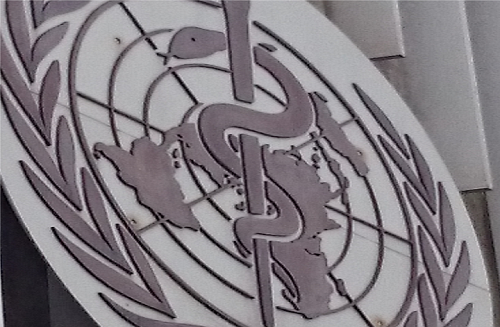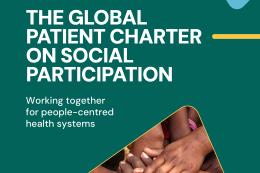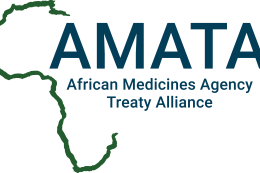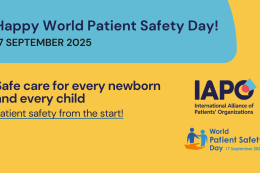WHO calls for all clinical trial results to be published

Original article published by AllTrials here. Alison Lightbourne, Policy Manager of IAPO, is quoted towards the end of the article. IAPO has previously endorsed the AllTrials campaign here. Useful links are available at the bottom of the page.
A strong statement from WHO
Its Statement on Public Disclosure of Clinical Trials Results:
- says results from clinical trials should be publicly reported within 12 months of the trial’s end
- calls for results from previously unpublished trials to be made publicly available
- calls on organisations and governments to implement measures to achieve this.
This is a strong statement from the WHO. It has been welcomed by patients, doctors and researchers worldwide. The best available evidence shows that around half of all the clinical trials that have ever been carried out have never reported results. This means that doctors, patients and medical regulators cannot make informed decisions about which treatments are best. It means that hundreds of thousands of patients have volunteered to take part in clinical trials where results have been kept hidden. It means that information about the medicines we use every day is at risk of being lost forever.
The best available evidence shows that around half of all the clinical trials that have ever been carried out have never reported results.
Congratulations to the hundreds of people and organisations who wrote to the WHO to set out in their own words why the WHO should call for old information to be made available. Today’s great news only came about because of you. Please share this news on Twitter and Facebook and with your friends, family and colleagues.
Take up the challenge
Of course, although it is an influential organization the WHO has no legislative power. It will be up to companies, research groups, funders, regulators and legislators to take up the challenge laid down by the WHO today. In an invited commentary, published in PLoS Medicine alongside the WHO statement, Ben Goldacre has set out a series of practical suggestions to drive up standards and prevent trial reports being withheld. The AllTrials campaign wants to hear from everyone who can help progress these suggestions and your ideas on how to implement them. Please get in touch.
Responses from campaigns, doctors, patients and consumer groups
Síle Lane, Director of Campaigns, Sense About Science, co-founding organisation of the AllTrials campaign:This is the first time the WHO has taken a position on reporting of clinical trial results. That it’s such a strong position is a fantastic acknowledgement of the thousands of patients, doctors and researchers who have been urging everyone who has a role in clinical trial reporting to do what they can to make all clinical trials count. The WHO has stated unequivocally that the era of secrecy around clinical trial results must end.
Richard Stephens, cancer patient and clinical trial participant:The call from the WHO for old information to be shared is hugely welcome. Patients who choose to take part in clinical trials believe that by doing so, we are helping other patients in the future. We do not expect the knowledge to be kept secret or the help for others to be denied. It is immoral to recruit patients to clinical trials and then not report or share the results. We hope the call from the WHO will be taken up by everyone who can help uncover hidden information.
Dr Ben Goldacre, author and co-founder of the AllTrials campaign:This is a very positive, clear statement from WHO, and it is very welcome. But withheld trials are already in breach of multiple existing codes, declarations, and even laws: delivering change will require more than good intentions. We need individual accountability, from robust public audit. Only this can show us exactly which researchers, companies, institutions, funders and treatments are the best – and the worst – for withheld data. With this individually accountable data we can finally reward good practice, learn from the best performers, and ensure that those withholding information are held fully to account.
Dr David Tovey, Editor in Chief, Cochrane Library, co-founding organisation of the AllTrials campaign:The announcement by the WHO to make available all previous unpublished studies is a substantial step forward. For Cochrane this means that our researchers would have access to more of the data they need, in order to inform decision making by consumers of health care, health professionals and policy makers more effectively.
Dr Virginia Barbour, chair of the Committee on Publication Ethics, member of the AllTrials campaign:The statement from the WHO is a really welcome signal of concrete and specific leadership in public disclosure of clinical trial results. Crucially, the statement specifically recognises that access to past trials is as important as future trials. It won’t be possible now for any organisations or individuals involved in trials to have a legitimate excuse to not engage with this important issue.
Professor Carl Heneghan, Director, Centre for Evidence-based Medicine, Oxford, co-founding organisation of the AllTrials campaign:The WHO position statement on reporting of results is an important step forward in the trial transparency campaign. Significantly, the WHO’s statement also includes publically disclosing the results from older clinical trials, which remain unpublished and the trial identifier should always be included in publications. These two steps will allow easier identification of trials and allow better assessment of the effectiveness of both older and newer drugs. The WHO’s International Clinical Trials Registry Platform (ICTRP) provides the means to publish summary results, and there are now no reasons, or barriers, to not publishing clinical trial results within the stipulated 12 months time frame.Professor Heneghan is on the advisory panel of the WHO’s ICTRP.
Ilaria Passarani, Head of the Food & Health Department, the European Consumer Organisation, BEUC:The WHO’s revised statement is a landmark move for consumers. All data disclosure policies should make past trials’ reports available. Complete, accurate and easy-to-understand information about medicines is essential to empower consumers so they can choose their treatments knowingly. It is truly the only way consumers can have objective information about most of the medicines they are prescribed or purchase over the counter today.
Sascha Marschang, Policy Manager for Health Systems, European Public Health Alliance:EPHA is pleased with the WHO statement since patients who take part in clinical trials would like this research to be available for the future benefit of society. In order to avoid costly duplication of work and prevent selective reporting of results, it is crucial for all trials to be reported and for old trial data to be accessible, regardless of whether they were completed or not. From a public health perspective, transparency and access are key prerequisites for making clinical trials as productive and inclusive as possible as they ultimately serve to improve population health.
Alison Lightbourne, Policy Manager, International Alliance of Patients’ Organizations:We welcome these steps towards greater transparency in clinical trial results. This further opens the door for patients to access accurate, relevant information that helps them make informed decisions about their healthcare. Without this, patients can lose control of key choices that affect their lives.
We call on governments, the healthcare industry and healthcare professionals to follow the WHO recommendations by actively publishing and communicating full clinical trial information in clear and unambiguous language. This supports meaningful patient involvement in policy and decision-making at all levels of national health systems, clinical trials, reporting and treatment.
Read more
Media release: WHO Calls for Increased Transparency in Medical Research
Moorthy VS, Karam G, Vannice KS, Kieny M-P (2015) Rationale for WHO’s New Position Calling for Prompt Reporting and Public Disclosure of Interventional Clinical Trial Results. PLoS Med 12(4): e1001819. http://journals.plos.org/plosmedicine/article?id=10.1371/journal.pmed.1001819
Goldacre B (2015) How to Get All Trials Reported: Audit, Better Data, and Individual Accountability. PLoS Med 12(4): e1001821. http://journals.plos.org/plosmedicine/article?id=10.1371/journal.pmed.1001821



